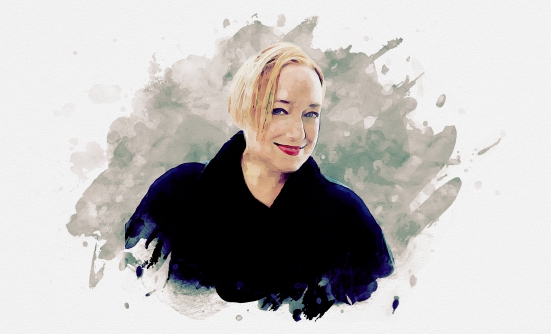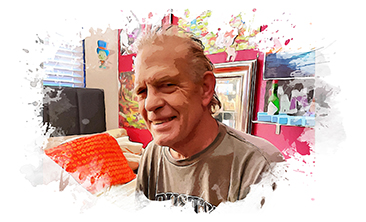
Fitness and cancer. Those 2 words seem to be diametrically opposed, don’t they? When I was first diagnosed in the spring of 2018 with stage III rectal cancer, I used to joke with my oncologist that I was the healthiest guy with cancer that he had ever met.
Trainer and Athlete
At that time, I was a part-time personal trainer and a veteran strength athlete going on 16 years of competition. Like everyone, immediately after hearing the “C” word, I wandered around stunned for about 2 weeks, as if I had been struck in the face with a two-by-four.
When I found out what was planned for my treatment, I got busy! I knew I was going to lose at least 1.5 feet of the colon during the colectomy (surgical removal of part of the colon) and had a good chance of getting a permanent colostomy, or stoma, so I devised a plan.
I was already in good shape. However, I knew they would go through my abdominal wall to operate, and of course the stoma would be located there, if needed. I focused my attention on strengthening my abs as aggressively as I could, considering the amount of time I had before surgery. I wanted to be strong before the operation to help promote healing after.
Now, 2 years after my cancer diagnosis, I am a full-time personal trainer and strength coach, training people in person as well as online. Although I had my hopes high, I did not escape a permanent colostomy. Believe it or not, the biggest concern I had over the colostomy was that I would not be able to compete in my sport again. Because there is an opening in the abdominal wall for the stoma, the risk of herniation is extremely high.
Staying Fit
Two weeks after the surgery, I began training again, with an interruption when chemotherapy began to hit truly hard, causing me to lose 36 pounds. In October 2019, after putting back on some of the weight, I competed in my sport again. I am a Scottish Highland Games athlete. Had I not been in the shape I was before surgery, had I not kept up with the training after the surgery, I would not have been able under any circumstances to pull that off.
The importance of physical fitness cannot be overstated when going through cancer. We all know that the treatment is often harder on us than the disease itself.
I try to encourage oncologists and surgeons to get their patients in a fitness program as early as possible, to help them endure the process and stay strong before, during, and after their treatment.
The psychological benefits of exercise are especially important to this patient population. Besides the endorphin release during exercise, people are being put in control of some aspect of their physical well-being when they are struggling to have any control at all.
This was important to me during my personal journey with cancer, and it continues to be important to this day. I currently train 2 people who have stage IV pancreatic cancer. One of them is a runner, who is preparing for a half marathon, and the other person is planning for a trip to Europe next year.
The great thing about life is—just when we think we have found our way, our path is altered by a storm, forcing us to take a step onto another path.
Clear Blue Sky
I never viewed my cancer in a negative way. I saw it as a gift. Let me explain—2 weeks after my diagnosis, I was competing in the first Highland game of the year in 2018. At that time, my diagnosis was still only known to my wife and to me.
It was a beautiful clear spring day, with a temperature in the high 70s. As I stepped onto the throwing field that day, I noticed that many of my old friends were there as well. I had been competing for the past 16 years by then, so seeing friends that were throwing as long as I did was truly a blessing. I astonished myself with how well I was throwing that day—muscle memory is a hell of a thing!
But then again, perhaps it was my attitude that day that made a difference. That is to say that I was not focused on trying to throw far, or on critiquing my form as I competed. I was enjoying the camaraderie with my friends, and the amazing clear blue sky.
I commented many times on how beautiful the sky was that day. The band that was playing in one of the pavilions sounded just awesome! I remember that while I was on a break from throwing, I was just taking in the music for a good half an hour or so. I finished second overall in my division that day.
The day was an unexpected gift. I have also come to realize that my disease (in my view) was a gift. Knowing what I was facing made me appreciate what was in front of me—my wonderful and supporting family, my friends, and the blessing of a new day.
Life is short, and you never know how short it may be. I realized that day that the sky is always blue. You just need to look up. Your friends are always there. You just need to reach out.
The music is always playing. You just need to take the time to listen. You are the same person you were before. However, you have been given a gift of realization that you will not be here forever.
Alter the Storm
My cancer has also altered my professional focus. After getting their certifications, most personal trainers dream of training athletes or other experts. Like others in my field, I wanted to focus my training toward Masters athletes (those older than 35 or 40, like myself, who train for competition). This was a group I understood.
Now that I am more than 2 years walking on my new path, my career has become much more rewarding. I now specialize in working with people who are newly diagnosed with cancer or are currently going through or recovering from cancer, as well as ostomates.
Ostomates are individuals with a colostomy or ileostomy. About 2 years ago, I began working with patients with Parkinson’s disease. After going through my own diagnosis, I stopped and looked around to notice all the people around me whose paths had been altered by a storm and were trying to find their way.
I am blessed every day to work with the clients I have. I know that I make a difference in their day-to-day lives. We celebrate victories, small and large; we dig in hard when we experience a setback, and we make plans for our future.
If you are a patient with an ostomy or any patient with cancer, you can contact me at
Key Points
- Treatment for cancer is often more challenging than the disease itself
- The importance of physical fitness cannot be overstated when going through cancer
- The psychological benefits of exercise are especially important to people facing cancer
- Exercise releases endorphins, which aid psychological well-being, and exercise also helps patients gain a sense of control
- Ostomates are individuals with a colostomy or ileostomy after removal of part of the colon or other internal organs















